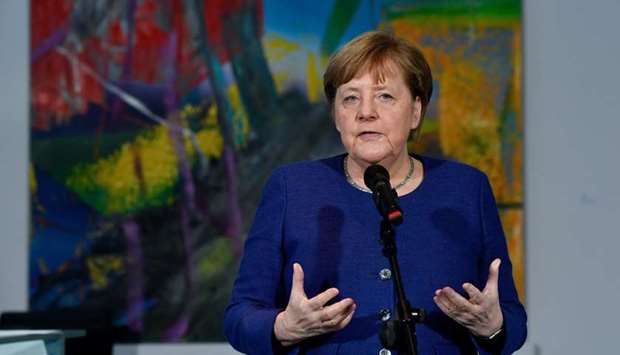Throughout her long chancellorship in Germany, Angela Merkel has repeatedly shown that she is good for a surprise. Now, she’s outdone herself.
In 2010, Merkel bucked expectations by insisting that the International Monetary Fund (IMF) be included in the effort to rescue Greece.
After 2011, she shut down Germany’s nuclear power plants, following the Fukushima disaster in Japan.
Then, in 2015, she opened Germany’s borders to more than 1mn Syrian refugees.
And now, she has agreed to a proposal for a joint €500bn ($556bn) recovery fund to help the European Union’s hardest-hit national economies through the Covid-19 crisis.
Every one of these policy decisions has provoked howls of outrage in Germany, as well as hand-wringing by other Europeans who are reluctant to allow Germany an outsize leadership role. But each time, Merkel has insisted that there was no alternative. Still, this latest surprise is by far her boldest. “The nation-state on its own has no future,” she declared during a recent press conference with French President Emmanuel Macron.
The prospect of a recovery fund has led many observers to wonder if the EU is finally approaching its “Hamiltonian moment.” In the early years of the American republic, the first US treasury secretary, Alexander Hamilton, argued that the federal government should “assume” the debts incurred by the states during the War of Independence. He won the debate, because debt mutualisation seemed necessary to resolve the emergency at hand.
But it would be a mistake to think that just any crisis can remove obstacles to deeper integration. When the euro crisis erupted a decade ago, federalists hoped it would lend momentum to the European project. Instead, northern and southern member states became more deeply divided over debt. In the ensuing years, both Russia and China have lured individual EU member states into their orbits, the United Kingdom has formally withdrawn from the bloc, and US President Donald Trump has all but abandoned the transatlantic alliance.
Like the debt and refugee crises, these geopolitical developments have all deepened Europe’s north-south and east-west divisions. The key historical conditions that would have allowed for a bold push beyond the nation-state were always missing. The question, then, is why Covid-19 should be expected to do what Russian President Vladimir Putin, Trump, Brexit, and earlier debt feuds could not.
There are two reasons to think that the current crisis is indeed different. For starters, the pandemic is fundamentally a crisis born of globalisation, requiring a co-operative global response. Second, comparisons of mortality and infection rates between countries and regions, and the terrifying depth and scale of the pandemic’s economic fallout, have put a premium on competent governance for much of the public. It is no secret why the United States, the UK, and Brazil have such high case numbers and death tolls. Each has an incompetent, ideological, and unco-ordinated government.
Unlike Trump or Brazilian President Jair Bolsonaro, Merkel and Macron are not inclined to deploy the politics of emotion. On the contrary, both pride themselves on being skillful managers who make evidence-based decisions. And the evidence from the Covid-19 pandemic suggests that the nation-state is indeed ill equipped for the crisis at hand; the most immediate needs are either highly local or supranational.
The question of “necessary responses” is especially poignant in Germany, which, like Italy, was a creation of 19th-century nationalism. Before Otto von Bismarck (and his Italian equivalent, Camillo Cavour), what we now call Germany was comprised of multiple small states. Each had its own rich sense of local identity, but none was particularly good at meeting the technical and economic challenges posed by a world of growing markets, trade, and new forms of communication and transportation. When these smaller entities unified, the liberal journalist Ludwig August von Rochau observed, it was not out of a “sympathy of souls,” but “purely” as a “matter of business.”
In other words, the nation-state was driven forward as a practical matter. Before the Peace of Westphalia in 1648, there were 3,000-4,000 independent territorial units to account for – most subject only to a loose imperial jurisdiction. By the eighteenth century, that number had been reduced to 300-400; and after 1815, all were members of the German Confederation. By the end of the 19th century, there were just three states with large German-speaking populations: the German Empire, the Austro-Hungarian Empire, and the Swiss Confederation.
In other words, the number of states in central Europe fell by a factor of ten every century or so. This is not to suggest that there will soon be just 0.3 states in central Europe – history does follow mathematical laws. Nonetheless, it is clear that old-style nation-states are being forced to reconsider where they stand in the world.
In fact, the recent ruling against the European Central Bank by Germany’s Federal Constitutional Court represents the final push toward a deeper level of EU integration. Though it nominally imposes a limit on the Bundesbank’s participation in the ECB’s bond-buying programmes, its effect will not be to arrest the European project, but rather to force the creation of a legal and political foundation upon which that project can be sustained.
Moreover, no European country’s constitution places a greater emphasis on the idea of Europe than Germany’s. The 1949 Basic Law states that the German people are “inspired” by “determination to promote world peace as an equal partner in a united Europe.” Even more to the point, Article 24 of that document explicitly provides for the abdication of sovereign rights for the sake of “a peaceful and permanent order” in Europe.
In the 19th century, nation-states were forged from blood and iron. Today, something new is being created out of medicine and economic policy. - Project Syndicate
* Harold James is professor of History and International Affairs at Princeton University and a senior fellow at the Center for International Governance Innovation.

German Chancellor Angela Merkel
